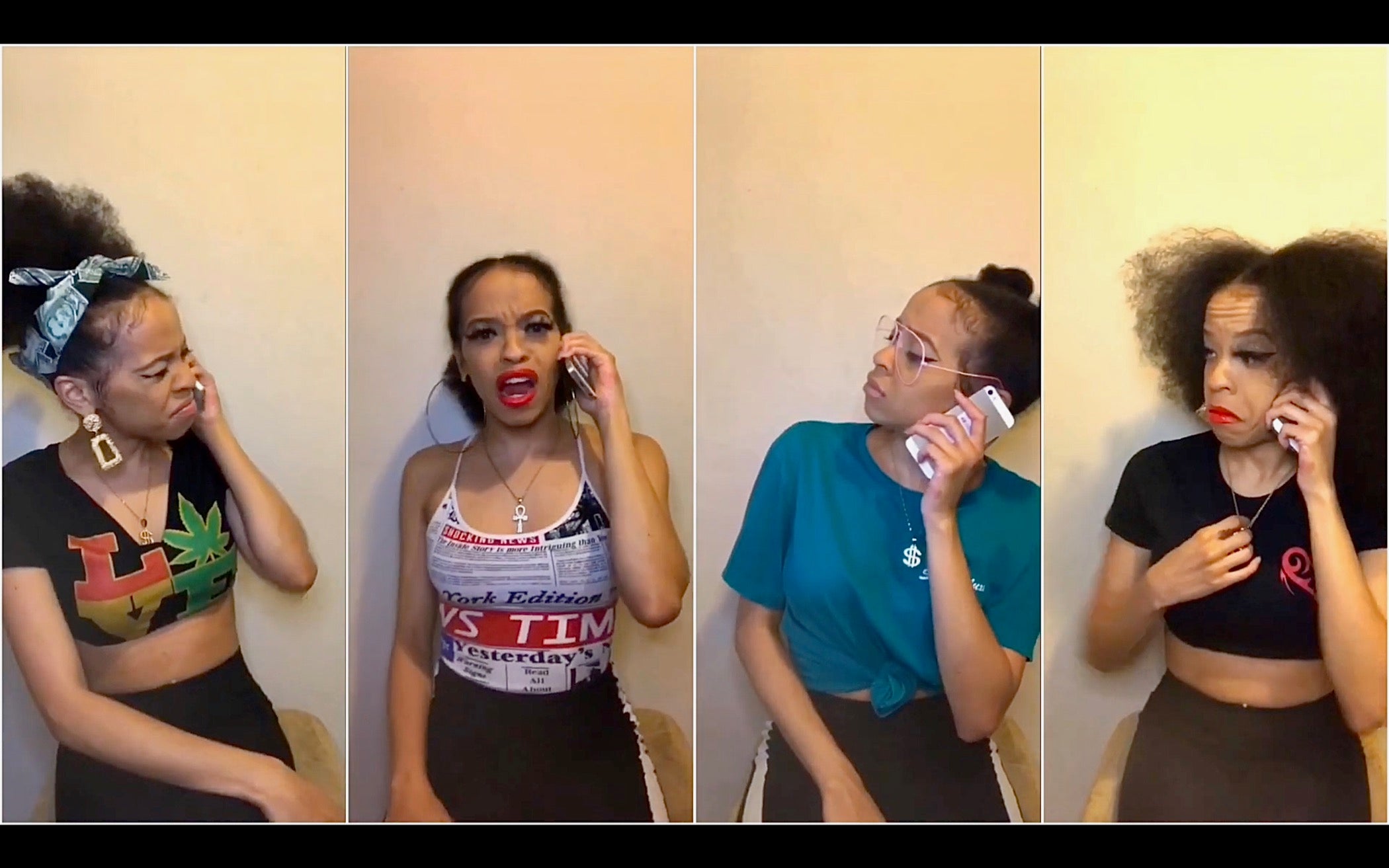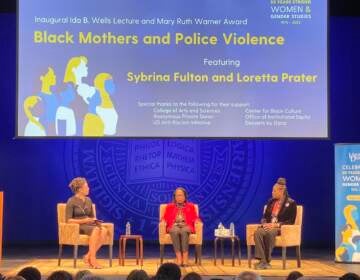Philly musicians make new kinds of protest songs for the summer of 2020
The ongoing protests against racial injustice are fueling Philly artists to make music for this moment.
Listen 4:47
Philadelphia rapper Louie V Gutta. (Emma Lee/WHYY)
Kachina Pindell goes by many names: ExtraKach on Instagram, KachMoolah on TikTok, in her YouTube videos she goes by Kisha, Alexis, China, and Heather (K.A.C.H., get it?)
From a branding aspect, it’s one big headache. “I don’t know why I didn’t want to be consistent,” she said with a laugh.
Small of stature with a big, pink braid piled on top of her head, Pindell had been singing in clubs around Philadelphia for many years, but a couple years ago she decided to double down on her internet presence. She started making videos of herself portraying each of the four Kaches singing together simultaneously in four quadrants of the screen.
Each Kach has a different personality.
“Kisha is the more stern one — the big sister. She knows everything,” said Pindell. “Alexis is hood, but she’s got a soft heart. China is sensitive and emotional, and Heather is more level-headed.”
Together, the four Kaches sing cover songs with their own reworked lyrics, trading lines like they are having a conversation with each other. Their version of Destiny Child’s “Say My Name,” is changed to “Say Her Name,” a popular chant heard in street protests as a way to remember and honor Black women and girls killed by police, especially Breonna Taylor.
“Waking up every day it’s the same. Killers going free. To me it’s just insane,” sings Heather.
Then China picks up the next line: “They started this violence, wanting our compliance. See how they kill our people, expecting us to stay silent.”
After the song exploded on TikTok, getting more than half a million views, Pindell got the ultimate accolade: Beyonce herself, formerly of Destiny’s Child, reposted the “Say Her Name” video on her personal Facebook page.

Pindell was not always writing protest songs. A few years ago she came up with the idea of splitting herself into four personalities as a clever way to make self-produced videos, harmonizing with herself.
“The Four Kaches were singing about boys,” said Pindell. “Not about society or what’s going on. It was about love: are we going to give into it? Or, I don’t trust him. It’s definitely changed now. Seeing the injustice has created a fire in me.”
The Four Kaches don’t always agree with each other. For another song, a cover of Da Baby’s “Rockstar,” Pindell’s personalities talk about the uprising earlier this summer, triggered by police killing George Floyd.
They each have a different reaction. China is overwhelmed and depressed. Alexis is up in arms. Heather wants to channel their energy into something constructive: “Take all your anger, take all your rage, and use it right now to make a change,” she sings.
“They were real emotions within me. You go through a process when you see what’s happening,” said Pindell. “One of the girls, Alexis, was happy about the looting. I don’t think it’s good those businesses had to suffer, but at the same time I felt something of a release. People are angry and, at some point, there’s only so much they can take of injustice and not being treated fairly. Those businesses didn’t deserve to get torn and looted, but there is no revolution without violence.”
Pindell aspires to put something new on TikTok a few times every week to build a social media audience, particularly during the pandemic. She has been able to prodigiously produce music and videos largely because she is a one-woman show: she writes the lyrics, sings all the parts, and brings her own skills as a professional sound engineer to record, shoot, and edit everything together.
For musicians that don’t work alone, making new protest music during the COVID-19 shutdown has been harder. Hardcore punk bands in Philadelphia like Soul Glo and Solarized have never shied away from writing about issues related to racial justice, but not right now because they make songs collectively as a band.
Alex Smith, the singer for Solarized, said his band has been on hold for months because of “various degrees of immune responses and people we are responsible for.”
Nevertheless, the Philadelphia punk scene responded very quickly to the summer of social unrest by releasing a compilation album, 19 Notes on a Broken System, featuring 19 previously recorded songs by bands like Solarized, Grey C.E.L.L., Open City, and the Dead Milkmen.
Album sales have raised thousands of dollars for the Philadelphia Community Bail Fund, Amistad Law Project, and the Black Trans Femmes in the Arts.
“There was lots of frustration about wanting to write and play and speak to the moment with new songs, but feeling stymied by social distancing,” wrote Janis Chakars, of Grey C.E.L.L., in an email. He helped put the compilation together.
The album may not have new songs, but cursing police brutality and systemic oppression is par for the course in punk.
“Punks, in my experience, are particularly sensitive to justice issues,” wrote Chakars. “There are not many love songs in the genre.”
Rapper Louie V. Gutta, from North Philadelphia, has had a new album ready to go for months. “King of the North” (Gutta is a big fan of Game of Thrones) is on the shelf, filled with what Gutta calls “normal” hip hop.
“Club music, street music, normal,” he said. “Like how life was before all this happened. That’s what I mean. Uptempo, upbeat, when you’re in a good place. Life is not good right now.”
Gutta delayed the release of “King of the North” to make a new track, “Black Man in Amerikkka,” written, recorded, and released in a matter of weeks.
“Right in the middle of the protests,” he said. “The looting, riots, everything. Right there.”
“For 400 years they had their knee on our neck. Damn right we upset,” he quietly raps over a relaxed beat and a delicate guitar riff. “It’s time to burn your system up, it’s time to lift our brothers and sisters up.”
Gutta got his start writing material for Meek Mill and 2 Chainz, and is known for songs about surviving the streets and anthems to making money. One of his videos is set at a bacchanalian pool party.
Even in the lyrics to “Black Man in Amerikkka” he raps that he is “far from an activist.”
“I don’t usually speak about this stuff,” he said. “I rap about the streets, nothing to do with politics.”
But after Breonna Taylor was killed by police in March and then George Floyd in May, Gutta started thinking about the long history of police brutality in America.
The video for “Black Man in Amerikkka” is comprised of film footage ranging from the 1950s showing two white police officers dragging a Black man down a street, to 1967 when two Black men wearing whiteface gave the Black Power salute in front of the Capitol Building in Washington, D.C., to video footage from earlier this summer of Philadelphia police firing tear gas at protesters as they scramble up the I-676 embankment.
“That is trying to show how much hasn’t changed. Yo, after all these years we’re still dealing with this,” said Gutta. “I just had a son: is this going to be over with by the time my son grows up? Is he going to have to deal with the same stuff? I wanted to show it’s a pattern, it keeps happening and keeps happening and keeps happening.”
“Black Man in Amerikkka” will be on an EP, “So Help Me God,” with a handful of other songs Gutta has made during the pandemic. They are all of a somber mood, like “Streets Don’t Love Nobody,” about the futility of trying to make a life on the street hustle. He plans to release the EP in September.
Someday, hopefully, he says the “King of the North” record will see the light of day.
“Whenever the time is right. I don’t feel that was needed right now,” he said. “Like, I got club records. We’re not going to clubs.”

Get daily updates from WHYY News!
WHYY is your source for fact-based, in-depth journalism and information. As a nonprofit organization, we rely on financial support from readers like you. Please give today.






